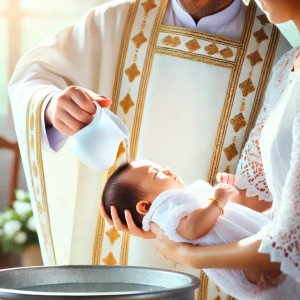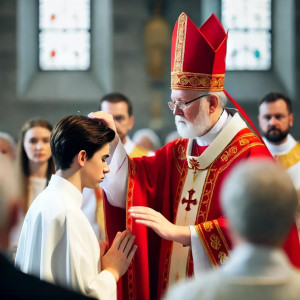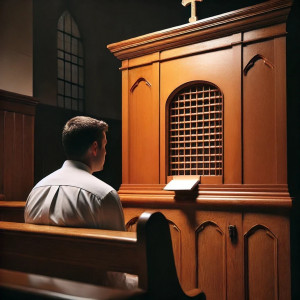1. Baptism
Baptism is the first sacrament of Christian initiation. Through Baptism, we are freed from sin, especially original sin, and reborn as children of God. It also makes us members of the Church. Jesus instructed his disciples to baptize in the name of the Father, the Son, and the Holy Spirit (Mt 28:19). In the book of Acts, Peter preaches that we should be baptized to receive forgiveness of sins and affirms that the promise is for all, including children (Acts 2:38-39). Baptism is compared to a spiritual rebirth, as Jesus says in John 3:5: "Unless one is born of water and the Spirit, he cannot enter the kingdom of God." Paul also teaches that through Baptism, we are united with Christ's death and resurrection, allowing us to live a new life (Rom 6:3-4; Gal 3:27). The practice of baptizing whole families is also found in Acts (Acts 16:15; Acts 16:33) and in 1 Corinthians (1 Cor 1:16).
2. Eucharist
The Eucharist is the sacrament in which bread and wine become the Body and Blood of Christ. It was instituted by Jesus at the Last Supper, when he said, "This is my body... This is my blood... do this in memory of me" (Lk 22:19-20; Mt 26:26-28). In John 6:51, Jesus states: "I am the living bread that came down from heaven; whoever eats this bread will live forever." The Eucharist is central to Christian life, as it unites us directly with Christ. Paul reaffirms this institution in 1 Corinthians 11:23-26, reminding us to continue celebrating the Eucharist until Christ's return.
3. Confirmation
Confirmation is the sacrament that strengthens Baptism by bestowing the Holy Spirit. In the book of Acts, the apostles lay hands on the baptized so they receive the Holy Spirit (Acts 8:14-17; Acts 19:5-6). In John 20:22, Jesus gives the Spirit to the apostles after the resurrection, showing that this gift is essential for the Christian mission. The author of Hebrews (Heb 6:2) mentions the laying on of hands as one of the fundamental principles of faith.
4. Penance (Confession)
The sacrament of Penance offers us forgiveness of sins. After the resurrection, Jesus gave the apostles the power to forgive or retain sins: "If you forgive anyone's sins, they are forgiven" (Jn 20:22-23). This power continues in the Church through priests, who hear confessions. The Epistle of James (Jas 5:16) also exhorts Christians to confess their sins to one another, showing the importance of reconciliation.
5. Anointing of the Sick
Anointing of the Sick is the sacrament of spiritual and physical healing for those who are seriously ill. The letter of James instructs that if someone is sick, they should call the elders to pray and anoint with oil in the name of the Lord, for "the prayer of faith will save the sick" (Jas 5:14-15). This sacrament is a way of asking God for healing and also for the spiritual strength to endure suffering.
6. Holy Orders
The sacrament of Holy Orders confers the ministry of service in the Church: deacons, priests, and bishops. Paul instructs Timothy not to neglect the gift given to him by the laying on of hands (1 Tim 4:14; 2 Tim 1:6), and in Acts, we see the apostles laying hands on the deacons, appointing them to service (Acts 6:6). The letter to the Hebrews reminds us that no one can assume this office unless called by God (Heb 5:4). The mission given by Jesus to baptize and teach in His name (Mt 28:19-20) is also part of the vocation of ordained ministers.
7. Marriage
Marriage is the sacrament that unites man and woman in a covenant of love, reflecting the union between Christ and the Church. The biblical foundation of marriage is in Genesis, where God unites Adam and Eve and says, "the two shall become one flesh" (Gen 2:24). Jesus reaffirms this indissoluble union in Matthew 19:4-6, saying that man and woman, united by God, should not be separated. Paul compares this union to the love of Christ for the Church (Eph 5:31-32).

Baptism
Baptism frees us from original sin and allows us to be reborn as children of God, marking our entry into the Church and Christian life. As Jesus said: “Unless one is born of water and the Spirit, he cannot enter the kingdom of God” (Jn 3:5). However, the Church recognizes exceptions, such as the “baptism of desire,” experienced by the good thief on the cross, who was saved by his faith and sincere repentance.

Eucharist
In the Eucharist, bread and wine truly become the Body and Blood of Christ, strengthening our union with Him. Jesus said: “Whoever eats my flesh and drinks my blood remains in me, and I in him” (Jn 6:56). This sacrament is the center of our faith, where we receive Jesus Himself, who nourishes and strengthens us to live in communion with God and with others.

Confirmation
Confirmation deepens the grace of Baptism by granting us the Holy Spirit to strengthen our faith, guide our choices, and make us true witnesses of Christ. It enables us to live the Christian commitment with courage and fidelity, especially in challenges and in serving others.

Penance (Confession)
Penance offers us forgiveness and reconciliation with God through the confession of our sins. Even after Baptism, which frees us from original sin, we can still sin; thus, Christ gave us Confession, as it is written: “If you forgive anyone's sins, they are forgiven” (Jn 20:23). This sacrament allows us to renew our friendship with God.

Anointing of the Sick
Anointing of the Sick offers spiritual healing and comfort, strengthening the sick with God's grace in moments of suffering. It is ideal for people in serious condition, before risky surgeries, or for the elderly facing frailty. This sacrament brings peace, courage, and prepares the soul for any outcome, trusting in Christ's love.

Holy Orders
The sacrament of Holy Orders consecrates deacons, priests, and bishops for service to the Church, granting them the grace and authority to continue Christ's mission. As Jesus said to the apostles: “As the Father has sent me, I am sending you” (Jn 20:21). This sacrament strengthens those who serve the people of God, guiding and building the community in faith and sacraments.

Marriage
Marriage unites a man and a woman in a sacred covenant of love and fidelity, reflecting the union between Christ and the Church. As Paul says: “Husbands, love your wives, as Christ loved the Church and gave Himself up for her” (Eph 5:25). This sacrament strengthens the couple in living true love, helping them to build a family rooted in faith and communion with God.
-
CIC 1210 - 1419
-
1. Baptism: Acts 2:38-39; Acts 16:15; Acts 16:33; 1 Cor 1:16; Gen 17:12; Mt 28:19; Jn 3:5; Rom 6:3-4; Gal 3:27; 1 Pet 3:21
-
2. Eucharist: Lk 22:19-20; Jn 6:51; Mt 26:26-28; 1 Cor 11:23-26
-
3. Confirmation: Acts 8:14-17; Acts 19:5-6; Jn 20:22; Heb 6:2
-
4. Penance: Jn 20:22-23; Jas 5:16
-
5. Anointing of the Sick: Jas 5:14-15
-
6. Holy Orders: 1 Tim 4:14; 2 Tim 1:6; Acts 6:6; Heb 5:4; Mt 28:19-20
-
7. Marriage: Gen 2:24; Eph 5:31-32; Mt 19:4-6
While every effort is made to ensure accuracy and conformity with the teachings of the Catholic Church, we acknowledge that errors in interpretation or presentation may occur. If you identify any answer or content that is not in line with the official teachings of the Church, we kindly ask you to inform us. We are committed to reviewing and promptly correcting any errors that are identified.
We understand that fidelity to the Church’s doctrine is fundamental, and for this reason, we value users' collaboration in maintaining the integrity of the content presented.
We thank you for your understanding and commitment to the Catholic faith.







